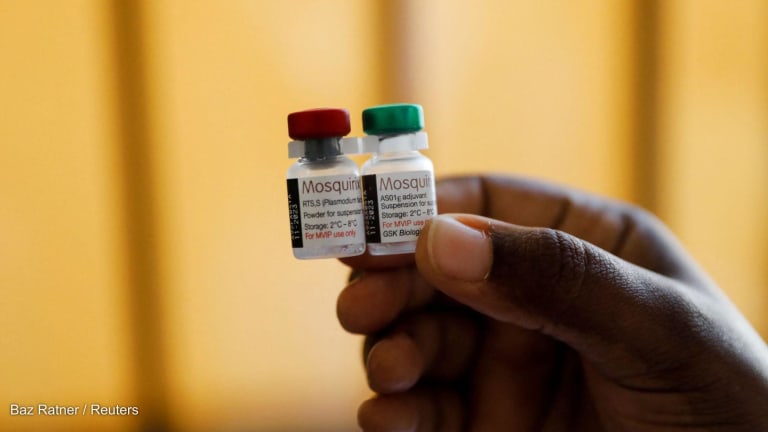
When the World Health Organization recommended widespread use of the first malaria vaccine last year, the news reinvigorated the fight against this deadly disease. The RTS,S vaccine has been many years in the making, between development timelines and subsequent field evaluations prior to the WHO recommendation. As the first vaccine against any parasitic disease, it represents a major milestone both for medical innovation and for global efforts to reduce the suffering and mortality caused by malaria.
Some in the global health community are now asking: Will we finally be able to eradicate this ancient scourge?
The reality is more complex, and history and science point to the need for a plurality of interventions to tackle malaria, a mosquito-borne disease that killed 627,000 people in 2020 — mostly in sub-Saharan Africa, one of the world’s lowest-income regions.
Global malaria cases rose in 2020 due to disruptions related to COVID-19, although they fell by 27% overall between 2000 and 2020.
For malaria prevention, no intervention is 100% effective on its own. Yet when tools are combined, their impact can be greater than that of any one alone.
Historically, insecticide-treated bed nets have been and still are a key intervention, preventing an estimated 68% of cases. However, some studies show that their efficacy is declining due to insecticide resistance, and next-generation bed nets are being created to combat this.
In addition, according to WHO, data from the RTS,S pilot program shows that more than two-thirds of children in Ghana, Kenya, and Malawi who didn’t sleep under bed nets could benefit from the RTS,S vaccine. Layering malaria prevention tools for children leads to coverage of over 90% by at least one of the two interventions.
A powerful combination of tools
Seasonal malaria chemoprevention, or annually distributed medicines, can be used to prevent malaria with up to 75% efficacy.
Recent trials show that when SMC and the RTS,S vaccine are used together, these two tools can make up one of the most powerful combinations to prevent malaria in children, the group most vulnerable to the disease. A 2021 study in Burkina Faso and Mali examined the use of the RTS,S vaccine alongside seasonal malaria chemoprevention. It showed that when implemented together, the combination was 62.8% more protective than SMC alone, and 59.6% more protective than the vaccine alone — a substantial difference.

Large-scale implementation of the two tools in parallel is now a key topic for discussion at the country level. But given the costs and supply of the vaccine, it won’t be possible to reach all children at risk, so prioritization will be needed.
Additionally, the age groups and geographic regions covered by preventive malaria medicines and the RTS,S vaccine differ, underlining the need for complementarity.
The vaccine has been recommended for children ages 5-17 months in sub-Saharan Africa and in other regions with moderate to high transmission of the P. falciparum malaria parasite. Seasonal malaria chemoprevention is used during the rainy season in Africa’s Sahel region yet covers a wider age group of children, from 3-5 months to 5 years old. Efforts are currently underway to extend its availability even further, to children as old as 10 years of age.
For malaria prevention, no intervention is 100% effective on its own. Yet when tools are combined, their impact can be greater than that of any one alone.
—An integrated approach
The evidence in favor of an integrated approach should send a strong message to the global malaria community: Investments in a plurality of tools — including bed nets, insecticides, diagnostics, medicines, and seasonal malaria chemoprevention, where eligibility criteria are met — are key to saving as many children’s lives as possible.
Not only must we continue to support increased access to a variety of current tools; we must also make investments in new innovations to fill unmet needs and prepare the global health community for the looming threat of resistance, which has begun to emerge against malaria medicines and insecticides.
The RTS,S vaccine is a major step forward. Yet reaching the global targets set for malaria requires sustained support for multiple interventions used in close coordination, alongside research and development to ensure that we will have even better tools to address evasion of diagnostic tests and resistance to insecticides and medicines. This will allow us to sustain the drive to eliminate malaria in the next three decades.









